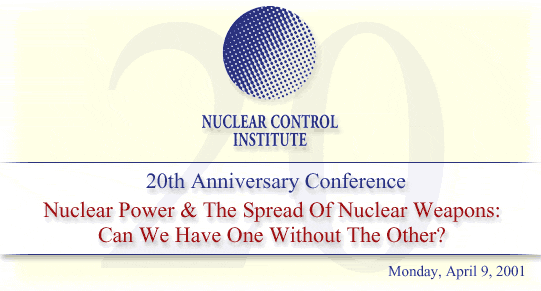

|
Conference
Program & Papers - Monday, April 9,
2001
| |
|
8:30AM |
Registration
& Continental Breakfast |
|
9:00
AM |
Welcome & Overview: Can we have nuclear power without nuclear proliferation? Is
there an irreducible proliferation risk posed by plutonium production in
reactors and by Paul Leventhal, President, Nuclear Control Institute |
|
9:20
AM |
How essential is nuclear power? To
a secure energy future? To combating the greenhouse effect? How viable are the advanced,
non-nuclear alternatives? Are renewable sources of energy and
hydrogen-fuel technologies realistic and dependable? Can these, in combination with
conservation and efficient use of energy, displace nuclear
power? |
|
9:30 |
The
case for nuclear power: Richard
Rhodes, author of "The Making of the Atomic Bomb" and "Nuclear Renewal:
Common Sense About Energy" |
|
9:50 |
Demand-side
alternatives: Amory
Lovins, CEO/Research, Rocky Mountain Institute.
|
|
10:10 |
Discussion
|
|
10:30 |
Break
|
|
10:45 |
Supply-side
alternatives: Robert
Williams, Senior Research Scientist, Princeton
University. |
|
11:05 |
Nuclear
power and the alternatives: Richard
Garwin, IBM Fellow Emeritus. |
|
11:25 |
Discussion
|
|
12:00-1:30 |
Luncheon Remarks by Rep. Ed Markey (1) Speaker: Robert Gallucci (2), Dean, Georgetown School of Foreign Service. The Continuing Relevance of Nuclear Power to the
Problem of Nuclear Weapons Proliferation |
|
1:45 |
How
realistic are the technical fixes for making nuclear
power Is
it possible to transmute plutonium, or to make recovery and use of
plutonium proliferation-resistant, or to render nuclear wastes free of
weapons-usable material? Overview:
Marvin Miller, Senior Research Scientist,
MIT. |
|
2:00 |
The promise of the technical fixes: James
Hassberger, Senior Nuclear Scientist, Energy & Environment
Directorate, Lawrence Livermore National Laboratory.
|
|
2:20 |
The
limits of the technical fixes: Edwin
Lyman, Scientific Director, Nuclear Control Institute.
|
|
2:40 |
Discussion
|
|
3:00 |
Break
|
|
3:15 |
Nuclear Power and Nuclear Weapons. What
role did civilian nuclear power play in the acquisition of nuclear weapons
by India, Overview:
Zachary Davis,
analyst, Z Division,
Lawrence Livermore National Laboratory; former senior specialist,
Congressional Research Service. |
|
3:30 |
Nuclear
power & nuclear weapons in India and
Iran: George
Perkovich, author of Indias Nuclear Bomb.
|
|
3:50 |
The
non-proliferation regime and fissile materials: Former
ACDA Assistant |
|
4:10 |
Response:
Paul Leventhal. |
|
4:25 |
Roundtable discussion:
Bertram Wolfe, past Vice-President/Nuclear, General Electric Co.; past president, American Nuclear Society Harold Feiveson, Senior Research Policy Scientist, Princeton University William
Lanouette, U.S. General Accounting Office; author, "Genius in the Shadows:
A Biography of Leo Szilard, The Man Behind the Bomb" |
|
4:45 |
Discussion
and Closing Remarks |
|
5:15 |
Adjourn
|
|
5:30-7:30 |
Reception
|